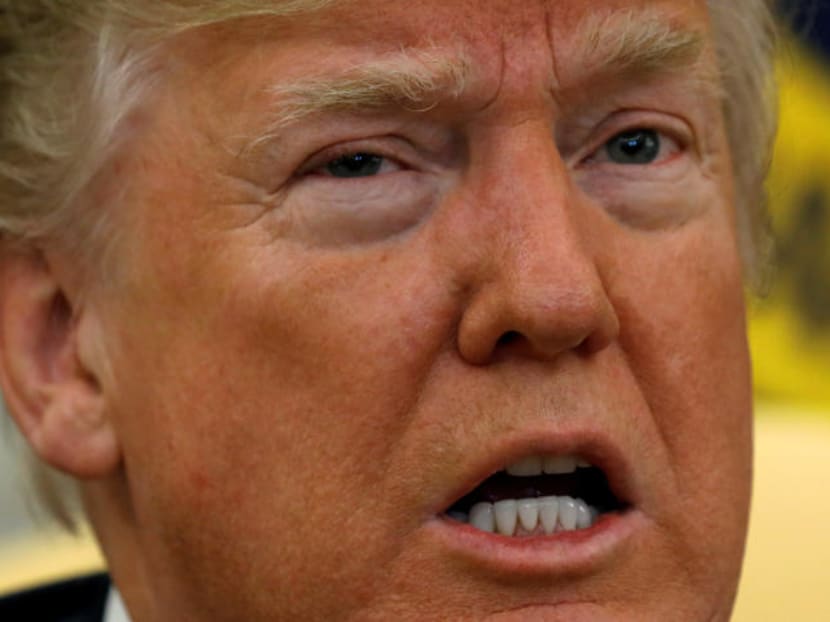Trump congratulates Putin on his re-election, raises no concerns about election meddling
WASHINGTON — US President Donald Trump congratulated President Vladimir Putin of Russia on Tuesday (March 20) on his recent re-election victory, but failed to ask him about either the fairness of the Russian vote, which Mr Putin won with a lopsided margin, or about allegations of Russian meddling in the 2016 presidential election.

US President Donald Trump congratulated President Vladimir Putin of Russia on his recent re-election victory. Reuters photo
WASHINGTON — US President Donald Trump congratulated President Vladimir Putin of Russia on Tuesday (March 20) on his recent re-election victory, but failed to ask him about either the fairness of the Russian vote, which Mr Putin won with a lopsided margin, or about allegations of Russian meddling in the 2016 presidential election.
Mr Trump also did not raise Russia’s apparent role in a nerve agent attack on a former Russian spy and his daughter on British soil, an act that prompted the United States to join with Britain, France and Germany in denouncing the Russian government for violating international law.
Instead, in his phone call with Mr Putin, the president focused on what the White House called “shared interests,” including North Korea, Ukraine and the escalating arms race between the United States and Russia. He said he and Mr Putin were likely to meet soon to discuss those issues.
“We had a very good call,” Mr Trump told reporters in the Oval Office, where he was meeting with Crown Prince Mohammed bin Salman of Saudi Arabia. “We will probably be meeting in the not-too-distant future to discuss the arms race, which is getting out of control.”
Mr Trump’s comments came five days after the White House imposed sanctions on Russia for its meddling in the 2016 election and other “malicious cyberattacks.”
It widened what has become a familiar gulf between the Trump administration’s tougher actions and words toward Russia and Mr Trump’s own stubborn reluctance to criticise Mr Putin.
The White House said on Tuesday that it was not the place of the United States to question how other countries conduct their elections * a contention that runs counter to years of critical statements by presidents and other officials about elections in Russia and many other countries.
“We don’t get to dictate how other countries operate,” press secretary Sarah Huckabee Sanders said. “We can only focus on the freeness and fairness of our elections.”
She later railed against the investigation of special counsel Robert Mueller into ties between the Trump campaign and Russia, which could have affected the results in 2016.
Mr Putin won with more than 76 per cent of the vote. International observers said Russian electoral authorities counted the votes efficiently, but that several other factors prevented the contest from being fair.
“Restrictions on the fundamental freedoms of assembly, association and expression, as well as on candidate registration, have limited the space for political engagement and resulted in a lack of genuine competition,” observers from the Organization for Security and Cooperation in Europe said in a report.
Sen John McCain, R-Ariz, the chairman of the Senate Armed Services Committee, was quick to criticise Mr Trump’s call to Mr Putin.
“An American president does not lead the free world by congratulating dictators on winning sham elections,” McCain said in a statement issued by his office.
“And by doing so with Vladimir Putin, President Trump insulted every Russian citizen who was denied the right to vote in a free and fair election to determine their country’s future, including the countless Russian patriots who have risked so much to protest and resist Putin’s regime.”
The White House pointed out that in March 2012, former President Barack Obama had a telephone conversation with Mr Putin and congratulated him on his election victory at that time.
Officials in the Obama administration said there was lively debate about whether, and when, Mr Obama should make that call. Mr Obama waited several days before calling, prompting questions about whether he was going to snub Mr Putin.
After the 2012 election, the State Department issued a separate statement in which it said, “The United States congratulates the Russian people on the completion of the Presidential elections, and looks forward to working with the President-elect after the results are certified and he is sworn in.”
In his remarks, MR Trump noted that Mr Putin has expressed concern about the escalating arms race between the United States and Russia.
He noted that his administration was spending US$700 billion (S$923 billion) to upgrade the US military, and said he would never allow Russia, or any other country, to approach its military might.
“We will never allow anybody to have anything even close to what we have,” Mr Trump said.
The president said he and Mr Putin would also discuss tensions in Ukraine, Syria and North Korea, among other issues.
The Trump administration issued a new nuclear policy last month that experts say will touch off a new kind of nuclear arms race one based less on numbers of weapons and more on new tactics and technologies.
The White House vows to counter a rush by the Russians to modernize their forces even while staying within the limits imposed by an arms control treaty negotiated by Mr Obama. THE NEW YORK TIMES






